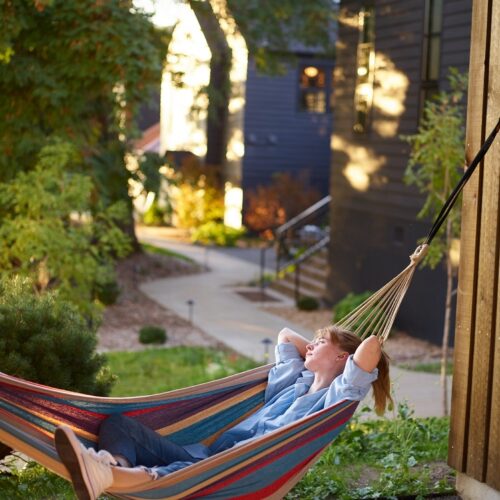A well-maintained garden not only enhances the beauty of your home but also contributes significantly to your physical and mental wellbeing. In the United Kingdom, gardeners have realised the immense benefits of creating spaces that promote health and harmony. By focusing on biodiversity and incorporating elements that encourage relaxation and mindfulness, a garden can become a haven that nurtures the mind, body, and soul.

The Importance of Gardens
Gardens play a crucial role in enhancing our overall health and wellbeing. They offer a chance to connect with nature, experience joy, and promote mental wellbeing. A well-designed and maintained garden not only improves the aesthetics of a home but also offers numerous benefits to the residents.
Taking part in gardening activities is known to have a positive impact on mental health. Studies have shown that gardening leads to significant reductions in depression and anxiety, and improved social functioning 1. Engaging in such activities provides a sense of accomplishment, relaxation, and an opportunity to escape from the stresses of daily life.
Gardens also serve as a connection to nature. Many people find solace and tranquillity in natural surroundings. In fact, research suggests that having even a small front garden with few plants can contribute to feeling happier, more relaxed, and closer to nature as it provides an opportunity to observe and enjoy the beauty and serenity of flora and fauna.
Furthermore, spending time in gardens can contribute to improved physical health. The act of gardening involves various forms of exercise, such as digging, lifting, and stretching, which can improve overall fitness levels. Additionally, spending time in the fresh air and sunlight encourages the production of vitamin D, essential for maintaining good bone health and a robust immune system.
Designing Your Garden for Harmony
Understanding Your Space
A harmonious garden starts with understanding the space you have and how it interacts with the natural environment. In the UK, gardens can range from compact urban plots to expansive rural landscapes. Regardless of the size, evaluating the sunlight exposure, local climate, and the existing features within your garden is crucial. This will not only help you create a balanced space but also ensure the plants you choose will thrive in their new environment.
Additionally, incorporating elements such as water features, seating areas, and calming colours can foster a sense of harmony within your garden. When planning these features, take into consideration their placement, scale, and how they will integrate with the existing elements in your garden.
Choosing the Right Plants
The selection of plants plays a vital role in creating a harmonious UK garden. Considering the diverse climate of the country, it’s important to choose plants that can adapt well to your local weather conditions. Native plants should be your first option as they often require less maintenance and are more likely to support local wildlife.
To enhance the harmony in your garden, focus on incorporating plants with varying heights, textures, and colours. This will create visual interest and balance throughout your outdoor space. Additionally, incorporating scented plants can provide a multi-sensory experience and contribute to the overall sense of wellbeing.
- Sunlight-Loving Plants: Lavender, rosemary, and salvia thrive in full sun. Their vibrant colours and fragrances will enliven your garden, whilst also supporting pollinators.
- Shade-Tolerant Plants: Ferns, hostas, and hellebores are excellent choices for UK gardens with low light levels. Their contrasting shapes and textures will create depth in shaded areas.
- Plants for Small Spaces: Compact gardens can still achieve a harmonious design by using climbing plants, such as clematis, jasmine, and honeysuckle. These vertical growers can be trained to fill walls or trellises, maximising the use of limited space.
Promoting Biodiversity and Protecting Wildlife
Enhancing biodiversity in your UK garden not only positively impacts the environment, but also creates a space for health and harmony. A diverse garden attracts a variety of wildlife, such as pollinators, birds, bees, butterflies, and hedgehogs. By following a few simple steps, you can turn your garden into a haven for these creatures.
Choosing native plants helps provide food and shelter for local wildlife. Opt for a mix of trees, shrubs, and flowering plants to offer an assortment of resources for different species. Incorporating elements like mixed hedges further increases the habitat potential of your garden. Trees not only offer food in the form of flowers, fruits, and seeds, but also provide indispensable habitat for birds and insects.
Providing shelter is another crucial step in promoting biodiversity. Birdhouses, bee hotels, and hedgehog houses are all excellent options to accommodate a variety of species. Additionally, consider leaving certain areas of your garden a little untidy or wild, as this encourages species like hedgehogs to forage and nest.
Creating a wildlife-friendly water source, such as a pond or bird bath, can make a world of difference for thirsty creatures. Ensure that any water sources have sloping edges to allow for easy access and exit, reducing the risk of drowning for smaller animals.
Finally, restrict the use of chemical pesticides and herbicides, as these can negatively impact both biodiversity and wildlife health. Instead, consider adopting natural pest control methods like attracting beneficial insects or using companion planting to ward off harmful pests.
Advanced Gardening Solutions
In the world of gardening, there is a constant evolution of technology and practices aimed at enhancing the health and harmony of your garden. As a gardener in the UK, it is essential to keep up with these advancements to ensure your garden thrives and benefits from the best possible care.
One such advancement in gardening solutions is the use of sustainable landscaping. This approach focuses on creating a green and healthy outdoor environment that is both beautiful and ecologically friendly. Sustainable landscaping techniques involve incorporating native plants, promoting biodiversity, and using natural methods for pest control1. By following these practices, gardeners in the UK can cultivate a garden that promotes well-being and respects the environment.
Another cutting-edge development is the utilisation of siphonic drainage systems, such as those designed by Capcon Engineering. These innovative systems optimise water management in gardens, ensuring proper drainage and efficient use of water resources. As water scarcity is an increasing concern in the UK, the implementation of siphonic drainage systems is becoming a practical and popular solution for advanced garden management.
In addition to the above advancements, gardeners in the UK can improve their gardens’ health by employing a range of integrated pest management strategies. These methods include biological control, cultural control, and the use of less toxic pesticides. By adopting these integrated pest management strategies, you can protect your garden’s biodiversity while maintaining its health and vitality.
Sustainable Gardening Practices
Sustainable gardening focuses on maintaining a healthy garden while minimising any negative impacts on the environment. Adopting eco-friendly methods such as using organic materials, natural fertilisers and reducing the use of harmful pesticides can make a significant difference in the overall health and harmony of your garden.
One of the key elements in sustainable gardening is promoting biodiversity. This can be achieved by planting a variety of native species, encouraging natural predators of pests, and providing suitable habitats for wildlife. Reducing hard surfacing areas and replacing fences with hedging can contribute to a more sustainable garden as well ^.
Using organic materials in your garden can support soil health and improve drainage, while also reducing waste. Composting household and garden waste is an effective way to recycle these materials into nutrient-rich matter for your plants. This natural fertiliser provides essential nutrients for plant growth, without resorting to synthetic alternatives that can harm the environment. Creating compost heaps or bins can be done easily with minimal effort, leading to a healthier garden and reduced waste.
When managing pests in a sustainable garden, it is important to minimise the use of synthetic pesticides. Instead, consider implementing biological controls such as introducing beneficial insects like ladybirds to combat aphids. Additionally, practicing garden hygiene by removing dead foliage and debris can help prevent disease outbreaks and reduce pest populations.
The Role of Trees and Lawns
Trees and lawns play a significant role in enhancing the health and harmony of a garden. They not only provide visual appeal but also offer numerous environmental and well-being benefits.
Trees, in particular, contribute to the garden ecosystem by providing shelter and habitats for various wildlife species. Furthermore, they act as natural air purifiers, absorbing pollutants and carbon dioxide, and releasing oxygen into the atmosphere. Consequently, this contributes to improved air quality and a healthier environment for garden users. Additionally, trees also serve as a natural sound barrier, reducing noise pollution from nearby roads or urban areas.
Lawns, on the other hand, serve as a valuable green space that can absorb rainfall, helping to prevent water-logging and reduce the risk of flooding. By covering the ground with grass, it minimises soil erosion, filters pollutants from rainwater, and acts as a natural temperature regulator. In warmer months, a healthy lawn can keep the garden cooler, providing a pleasant outdoor area for relaxation and recreation.
The combination of trees and lawns creates an inviting green space that encourages physical activity and mental relaxation, promoting overall health and well-being. Studies have shown that spending time in nature can lower blood pressure, reduce anxiety, and improve mood.
To ensure a thriving garden, it is essential to maintain both trees and lawns in good condition. Regular pruning of trees, for instance, promotes their growth and prevents the spread of diseases. Similarly, proper lawn care, such as mowing, aerating, and watering, contributes to a lush and healthy grass cover. By sustaining this balanced green space, garden owners and users can enjoy the myriad health benefits offered by trees and lawns.
Growing Good Health
Gardening not only provides an opportunity to grow fresh food, but also offers a range of health benefits. By cultivating a variety of vegetables, herbs, and plants, UK gardeners can create a space that promotes both physical and mental wellbeing.
Growing your own vegetables and herbs not only encourages healthier eating habits, but also contributes to a sense of achievement. Fresh produce offers an abundance of nutrients, vitamins, and minerals essential for maintaining a healthy lifestyle. By dedicating a section of your garden to cultivating nutrient-rich foods such as leafy greens, tomatoes, and root vegetables, you can enjoy the satisfaction of a bountiful harvest.
In addition to growing nourishing vegetables, maintaining a healthy garden environment is crucial for plant health. Gardeners can minimise pests and diseases by adopting eco-friendly practices, such as using organic compost, mulching, and attracting beneficial insects.
Focusing on plant health not only results in a more productive garden but also contributes to mental wellness. Engaging with nature through gardening activities can provide relaxation, comfort, and enjoyment. In fact, gardening is known to benefit people with mental health issues and is often used to complement traditional medical care, according to the RHS.
Observing and Learning
Spending time in the garden provides a wealth of opportunities for learning and personal development. Observing the intricate details of plants, inspecting for signs of disease, and appreciating the horticultural aspects of your garden can all contribute to a greater sense of well-being. Engaging with the local wildlife and understanding their role in the ecosystem can also be a beneficial experience.
Developing your horticultural knowledge begins with learning to recognize various plant species and understanding their specific needs. As you gain experience, you become more adept at identifying potential problems, such as infestations or diseases, and taking necessary steps to keep your garden healthy. Actively learning about the plants in your garden can provide a sense of accomplishment and help strengthen your connection to nature.
Regularly inspecting your garden for signs of disease allows you to address issues at the earliest stages, ensuring that any challenges are managed effectively. By carefully observing the plants in your garden and remaining vigilant to potential threats, you can contribute to the overall health and harmony of your outdoor space.
Interacting with local wildlife is another key component to enhancing your garden environment. Birds, bees, butterflies, and other creatures all play essential roles in pollination and pest control. By incorporating plants that attract and support these species, you actively contribute to the diversity and balance of your local ecosystem.
Continuing to keep learning about the natural world around you, whether it’s in your own garden or more broadly, helps build confidence in your abilities and understanding of the environment. As a result, you foster a deeper connection with nature, which ultimately enhances both your health and harmony.
Conclusion
Gardeners and growers in the UK can significantly enhance their gardens for health and harmony by creating spaces that evoke a sense of calm and resilience. Incorporating elements that promote relaxation, such as a comfortable bench, can encourage individuals to spend more time in their gardens, enjoying the benefits of the natural environment.
© Copyright 2023 Antonia, All rights Reserved. Written For: Tidylife


Leave a Reply